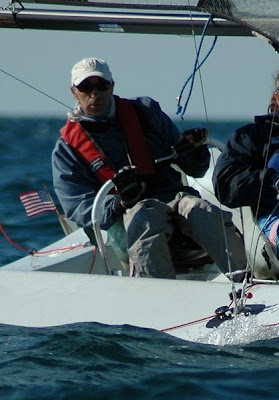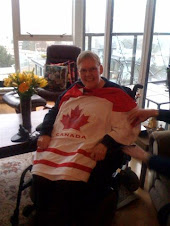

Nick Scandone, 42; sailor won gold medal after ALS diagnosis
By Claire Noland Los Angeles Times / January 8, 2009
LOS ANGELES - Nick Scandone, a sailor who won a gold medal at the 2008 Paralympic Games in China six years after having been stricken with Lou Gehrig's disease, died Friday at his home in Fountain Valley, Calif. He was 42.
Sailing since he was 8, Mr. Scandone was an All-American yachtsman at the University of California, Irvine, who fell just short of qualifying for the 1992 Barcelona Olympics. He left competitive sailing until he was diagnosed in 2002 with amyotrophic lateral sclerosis, commonly known as Lou Gehrig's disease.
Three years later, Mr. Scandone was named US Sailing's Rolex yachtsman of the year after beating an 88-boat fleet of able-bodied and disabled sailors in the 2.4-meter open world championship regatta off the coast of Italy. He has been nominated for the 2008 award, sailing's highest honor; the recipient will be announced later this month.
In September, as skipper of a two-person keelboat, Mr. Scandone and crew member Maureen McKinnon-Tucker, a paraplegic from Marblehead, Mass., won the gold medal in the SKUD-18 class at the Paralympics regatta in Qingdao, China.
"Nick Scandone redefined the power of the human will to survive and to succeed," McKinnon-Tucker told The Boston Globe.
Mr. Scandone's wife, Mary Kate, and his brother, Rocky, accompanied him to China and cheered him on during the international competition for disabled athletes. The US team chose Mr. Scandone as its flag bearer for the opening ceremony at Beijing.
"It was inspirational," Rocky Scandone said. "Nick knew what he wanted to accomplish, and he kept himself alive for the Olympics. When he was diagnosed with [ALS], we thought it would be a couple years. Around the fourth year he had his eyes set on the Olympics. . . . No one thought he would be that strong, to last two years. He willed himself through it. It was an incredible, incredible journey."
An estimated 5,600 Americans annually develop ALS, a degenerative neuromuscular disease that affects nerve cells in the brain and spinal cord. Few live five years after being diagnosed.
"Without sailing, I don't know where I'd be," Mr. Scandone said after winning the gold medal.
A year after a doctor told him that his nagging back pain was caused by ALS, Mr. Scandone quit his job as a restaurant equipment salesman in 2003 and decided to devote the rest of his time to sailing.
At first, Mr. Scandone was strong enough to skipper a one-seat sailboat with adaptive equipment, but as he weakened and lost the use of his legs, he switched to the two-person dinghy fitted with hand controls.
"He was certainly the most disabled skipper who competed at the Beijing Games," McKinnon-Tucker told the Globe. "I would venture to say that he could quite be the most disabled athlete who was there."
In training, the pair had to adapt tactics and strategy as his condition worsened.
"It was all part of the plan," said McKinnon-Tucker. "I knew that his condition would change between when we met and when we would compete. Many people in the medical community, even friends and family, worried he would not make it due to how quickly ALS strikes most people.
"I continue to be amazed at how natural and brilliant of a sailor he was."
The victory was the pinnacle for Mr. Scandone, his wife said.
"It was bittersweet for me because I knew that once it ended, the disease was taking a toll on him, and he wouldn't be living much longer than that. But it was a joyous occasion."
In addition to his wife and brother, Mr. Scandone leaves his father, Vincent.
Globe correspondent Jenna Nierstedt contributed to this obituary.

































































































































































No comments:
Post a Comment